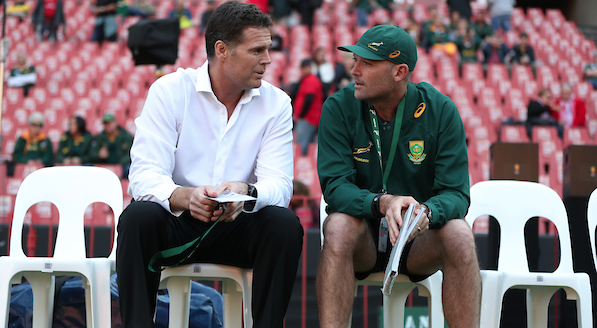In rugby, familiarity breeds success and, with South Africa’s 2019 Rugby World Cup championship squad scattered across the globe, the imminent British & Irish Lions tour is a unique race to cohesion, writes ZELIM NEL.
The world champion Springboks won’t have played serious footy together for more than 600 days when they line up against the touring British & Irish Lions in July, and they’ll have to win at least two of their next three (perhaps four) Tests to clinch the series.
Any team’s ability to play at optimal efficiency comes down to their cohesion. The more a team plays together, the more cohesive they become.
Traditionally, cohesion is an advantage the host nation holds over the Lions, a composite team made up of players from England, Ireland, Scotland and Wales.
What counts heavily in South Africa’s favour in 2021 is the pool of Lions hopefuls who have just emerged from an unconvincing Six Nations championship that was effectively decided by referees feverishly digging in their pockets for cards.
Not only will Warren Gatland’s squad have mixed feelings about their start to this Test season, the European club scene offers little respite after the Home Nations sent nine teams to the Champions Cup playoffs and only three advanced to the quarter-finals.
What should be a foreboding portent for the tourists is somewhat eased by a Bok squad that probably won’t have much more than a few training camps under the belt since winning the Rugby World Cup in November 2019.
‘It’s hard to be at the top of the tree all the time and so the team goes through cycles of success and cycles of failure and I think that’s a normal part of sport,’ Eddie Jones said recently, explaining England’s plummet from runners-up at the World Cup to a fifth-place finish in the Six Nations.
‘I knew that a tough period was coming, because we’ve had a good run, we’ve won games we probably shouldn’t have won. And you get on the other side of the ledger where you lose games that you should have won and it becomes tough. We’re in that period now.’
The question is, what period are the Boks in?
A global lockdown has denied them the opportunity to work through a possible World Cup hangover and regroup with renewed focus on the serious matter of taming the Lions.
‘In international rugby, you get to a certain stage and the success makes you a bit weak,’ added Jones. ‘You need to fight through that.’
Fighting each other is what the home-based contingent of the Bok squad has spent much of the past 18 months doing at varying degrees of efficiency as they’ve locked horns in multiple iterations of provincial derbies.
And though SA’s foreign exports to the PRO14, English Premiership, Top 14 and Top League have been in reasonable individual form, they’re a faction littered across the northern hemisphere from Dublin to Tokyo.
‘The Lions series tends to be something of a race to cohesion as both teams have so little time to prepare,’ said Ben Darwin, former Wallaby prop and co-founder of Gainline Analytics, who has done extensive research and predictive modelling to highlight the decisive role of cohesion in sustained, sporting success.
When South Africa faced the Lions at Kings Park in the first Test of the 2009 tour, it had been seven months since they’d beaten England 42-6 at Twickenham. But those players were drawn from just five teams that had been sharpening their axes in the Super 14 where the Bulls chopped up the Chiefs 61-17 in the final at the end of May.
The 2019 Rugby World Cup final match-day squad is currently on duty for 14 clubs or regions in six different countries.
It must be tempting for Rassie Erasmus and Jacques Nienaber to assess the current form of local players when they consider that Willie le Roux, Makazole Mapimpi, Malcolm Marx and Franco Mostert are currently mucking about in Japan, Handre Pollard, Pieter-Steph du Toit, Lood de Jager and RG Snyman are working their way back from injury and Vincent Koch is playing second-tier rugby in England.
Morne Steyn and Cornal Hendricks have been central to the Vodacom Bulls’ revival under Jake White, a lethal Sharks turnover-attack has featured Aphelele Fassi and Sikhumbuzo Notshe, and Stormers tighthead Neethling Fouche has been very impressive deputising for Bok anvil Frans Malherbe.
‘Part of South Africa’s success in 2019 was that barely any changes were made to the squad from the day Rassie took over,’ added Darwin. ‘In this series, there is simply no time to blood too many guys.’
ALSO READ: What’s in our latest issue?
Photo: Steve Haag/Getty Images




